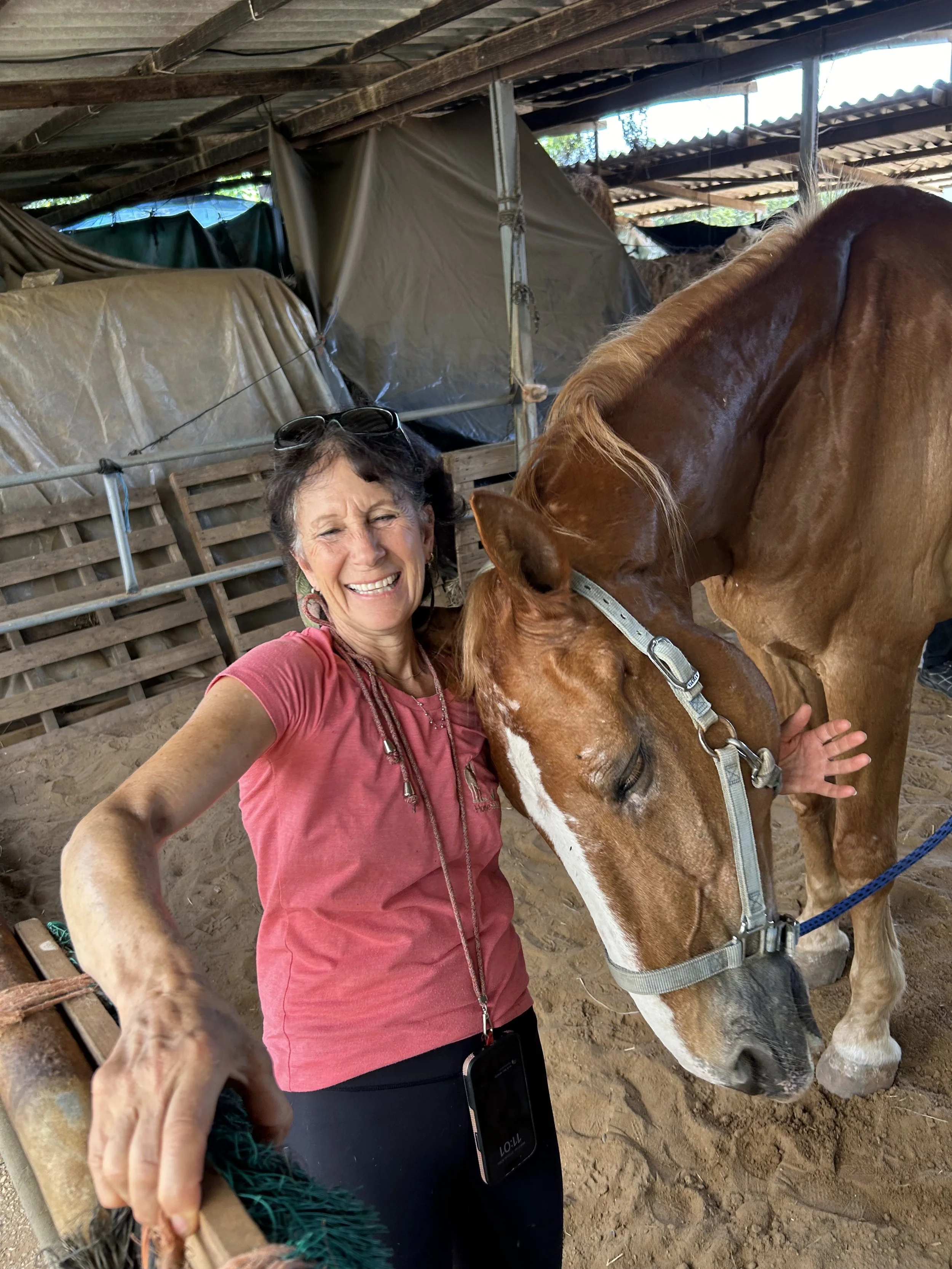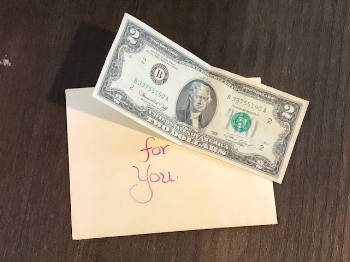Trauma is a brutal word. It’s not only the damage that occurs from physical or psychological wound; it’s also the wound that festers, long after the initial damage has been inflicted.
Israel is a traumatized nation this summer. On the surface, the cafés are occupied, the beaches are full, the tourists are touring, and so on. But the trauma is everywhere, barely beneath the surface. Even if every hostage were to return home tonight (amen!), and if Hamas were to surrender, and if Hezbollah were to cease raining missiles on the North—still it will take a generation to heal the trauma.
My friend—truly one of my heroes—Dr. Anita Shkedi is an authority on trauma, and earlier this week I went to observe the power of the therapeutic work she is doing.
I’ve known Anita for 30 years; she’s one of many Mitzvah-heroes I first met through Danny Siegel. She is a world-renowned expert on equine therapy (“therapeutic horseback riding”), which uses the holistic power of horses to heal broken bodies and broken spirits. In recent years, her attention has moved to healing trauma; her book Horses Heal PTSD: Walking New Paths is full of staggering stories of love and hope that should be read even by people who have never given horses more than a moment’s thought.
And then, October 7 and its aftermath: the massacres, the hostages, the horrors of war; the 125,000 Israelis from the Gaza envelope and the northern border who have been forced from their homes. The nation is grieving and writhing. In response, Anita and her team pivoted and created a new program: TRANSCENDING TRAUMA, “supporting individuals in the early, mid, and post stages of trauma, and then later if chronic PTSD has developed. It provides immediate intervention and treatment, builds resilience and encourages post traumatic growth. Transcending Trauma is an excellent way to regain a sense of trust and learn to manage this ongoing crisis.”
They’ve created groups from survivors of the Nova Festival. They’ve had groups of survivors from the kibbutzim that were devastated by the terrorists. Today, it’s a group of traumatized soldiers.
Anita Shkedi (left)
Nikki Kagan
I visited Anita and the team at “Piloni’s Place” on Moshav Hibbat Tzion, at the backyard horse farm of Nikki Kagan, a noted leadership consultant and horse expert. I met the group of eight participants who had gathered there for the day’s program:
· A soldier who is the lone survivor of his unit of thirteen fighters. Can you imagine the trauma that he carries with him?
· Another soldier whose job in Gaza is to recover the dead; to piece together pieces of bodies, give positive IDs, and get the bodies out of the combat zone to central command. Can you imagine…?
· A young soldier from Westchester County, New York, who came to be in the army of the Jewish people…
· And so on; five more people each of whom has seen death and destruction among friends and comrades-in-arms.
None of them, as far as I know, was a “horse person” before discovering this place.
The day unfolds this way:
First, the group gathers to say good morning and greet each other in the mercifully air-conditioned patio. They’ve become an intimate group in a short amount of time. Prior to finding Piloni’s Place, they had never met each other; each comes from a different army unit and lives in a different part of the country. As they arrive, we discover that each has brought a snack to share with the group: a watermelon, pastries, cookies, and so on—far more than we could eat that morning. As each person comes in and places onto the table the snack they’ve brought for the others, the whole groups bursts into laughter. No one asked anyone to bring anything! Anita tells me this instinct to take care of each other is a sign of their growing camaraderie and friendship.
Next, Nikki leads us in a short meditation and spiritual intention. And Anita gives gentle instructions for the day: “Talk to your horse as you’re riding,” she tells each participant. Not superficially, but she encourages each one to share how they’re feeling—what terrifies them, what keeps them awake at night, what they’re feeling deep inside. The bond between horse and rider is remarkably deep and holistic.
Then we adjourn to the stable, where the participants began to dress and groom the horses. But I also observe a process of getting in sync. The grooming is so physical and tactile: human hands caress the horses’ bodies as manes are combed, saddles are assembled, hooves are cleaned of debris, and so on. I can see the horses grow calm and comfortable, and the riders, too, are becoming attuned to their animals.
Then it’s time for riding and exercises. Each student mounts their horse and rides, occasionally raising their hands, or moving through obstacles, and following some basic exercises as instructed by Anita and her daughter-in-law Shani. There are smiles, serenity, a growing sense of security and self-awareness. The horses are steady and calm. Even though the day is brutally hot, I could stand in this spot and watch these riders for hours.
When the exercises end, the riders hose down their horses, return the equipment, and reassemble in the room where we began. There is some discussion and processing of emotions, as in any sort of therapeutic support group. There is laughter. Everyone seems looser, relaxed, and enjoying each other’s company. A beautiful sort of camaraderie has taken place among them; over the weeks that they’ve become part of this group, they’ve shared some intense therapeutic time together. They’re on the long, slow march to a place of confidence and self-worth, and fewer night terrors and isolation and doubt.
Tomorrow, a different group will be meeting here: Anita will be training trainers, who can spread out around the country and offer similar therapeutic groups on horseback for a traumatized nation.
I’m glad to be an emissary for the Kavod Tzedakah Fund, and I deliver a check for a few thousand dollars (each day’s session costs about $1000 to run; of course none of the participants pay anything). I’m also eager to give Anita some of the cash that friends entrusted me to give away in Israel: This, I tell her, is for ice cream and snacks for future groups, to make everything that much gentler.
This is an awesome place, and Anita and Nikki and their team are doing life-saving work. But the need is huge, for a damaged nation coming to grips with its trauma.
If you’d like to support the work of Transcending Trauma (the non-profit is officially registered as “Friends of Jonathan”) from America, there are three ways to do so:
1. A wire transfer directly to their bank in Israel; more information here: https://www.anitashkedi.com/transcending-trauma/
2. The Good People Fund, run by my friend Naomi Eisenberger in Millburn, NJ: www.goodpeoplefund.org;
3. The Kavod Tzedakah Fund, for which I am a volunteer allocations director, founded by Rabbi Yoshi Zweiback: www.kavod.org. (If you give through Kavod, please send me an email saying that you’ve directed a donation for Transcending Trauma.)














